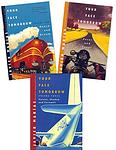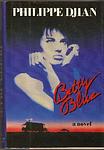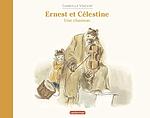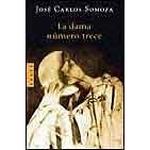The Greatest Spanish, French "Fiction" Books Since 1980
Click to learn how this list is calculated.
This list represents a comprehensive and trusted collection of the greatest books. Developed through a specialized algorithm, it brings together 290 'best of' book lists to form a definitive guide to the world's most acclaimed books. For those interested in how these books are chosen, additional details can be found on the rankings page.
Genres
Countries
Date Range
Reading Statistics
Click the button below to see how many of these books you've read!
Download
If you're interested in downloading this list as a CSV file for use in a spreadsheet application, you can easily do so by clicking the button below. Please note that to ensure a manageable file size and faster download, the CSV will include details for only the first 500 books.
Download-
1. The Lover by Marguerite Duras
"The Lover" is a poignant exploration of forbidden love, power dynamics, and colonialism. Set in 1930s French Indochina, it tells the story of a tumultuous and passionate affair between a 15-year-old French girl and her wealthy, older Chinese lover. The narrative delves into the complexities of their relationship, the societal norms they defy, and the inevitable heartbreak that follows. The protagonist's struggle with her family's poverty and her mother's mental instability further complicates the story, making it a compelling exploration of love, desire, and societal constraints.
-
2. The Elementary Particles by Michel Houellebecq
"The Elementary Particles" is a provocative novel that explores the lives of two half-brothers, one a molecular biologist and the other a disenchanted teacher, against the backdrop of late 20th-century France. The narrative delves into their personal struggles and emotional turmoil, resulting from their dysfunctional upbringing by a self-absorbed, hedonistic mother. Throughout the novel, the author uses their stories to critique contemporary society, touching on themes such as sexual liberation, consumerism, and the decline of traditional values. The book also delves into the implications of scientific advancements, particularly in the field of molecular biology.
-
3. The Shadow of the Wind by Carlos Ruiz Zafon
The novel follows the story of a young boy in post-war Barcelona, who discovers a mysterious book in a hidden library that his father takes him to, which houses forgotten books. The boy becomes captivated by the book and its author, but as he grows older, he realizes that someone is destroying all books written by this author. As he delves deeper into the mystery, the boy's life becomes intertwined with the author's, revealing a dark and tragic past that someone wants to be kept hidden. The story is a mix of romance, mystery, and a historical narrative set against the turbulent backdrop of a city recovering from war.
-
4. A Heart So White by Javier Marías
The novel delves into the complexities of relationships, secrets, and communication as the protagonist, a translator and interpreter, grapples with the mysterious suicide of his father's first wife and the pervasive silence surrounding it. Through his own marriage and his observations of others', he contemplates the unsaid and the power of words, both spoken and unspoken. The narrative weaves through time and memory, exploring the impact of the past on the present and the intricate ways in which people understand and misunderstand each other.
-
5. Platform by Michel Houellebecq
"Platform" is a provocative novel that explores the intersections of sex, business, and terrorism. The protagonist, a middle-aged man working in the French Ministry of Culture, embarks on a journey to Thailand after the death of his father. While there, he falls in love with a travel executive and they start a business capitalizing on sex tourism. However, their venture is violently disrupted by an extremist group, leading to tragic consequences. The novel is a critique of Western consumerism and a commentary on the clash between Western and Islamic cultures.
-
6. Suite Française by Irène Némirovsky
"Suite Française" is a two-part novel set during the early years of World War II in France. The first part, "Storm in June," follows a group of Parisians as they flee the Nazi invasion. The second part, "Dolce," shows life in a small French village under German occupation. The novel explores themes of love, loss, and survival, and provides a unique perspective on life in France during the war. The book was written during the war but was not discovered and published until many years later.
-
7. The First Man by Albert Camus
"The First Man" is a semi-autobiographical novel that explores the life of a man named Jacques Cormery, who grows up in poverty in Algeria, loses his father at a young age, and struggles with his relationship with his illiterate mother. The narrative delves into themes of identity, memory, and the human condition, as Jacques attempts to understand his past and his father's life, while simultaneously grappling with the harsh realities of colonial Algeria. Despite the challenges, Jacques remains determined to rise above his circumstances through education and personal growth.
-
8. The Club Dumas by Arturo Pérez-Reverte
The book follows Lucas Corso, a book detective who is hired to authenticate a rare manuscript by Alexandre Dumas. As he delves into the investigation, he finds himself entangled in a mystery involving two other books: a rare edition of "The Three Musketeers" and a satanic text, "The Book of Nine Doors of the Kingdom of Shadows". The narrative becomes a complex puzzle as Corso uncovers connections between the books, while also dealing with a seductive woman who seems to have stepped out of a Dumas novel, a mysterious killer, and a group of bibliophiles obsessed with Dumas. The lines between fiction and reality blur as he gets closer to the truth.
-
9. Bartleby & Co by Enrique Vila-Matas
"Bartleby & Co" is a metafictional work that explores the theme of "writers of the No," authors who cease to write or never start at all. The narrator, an office worker on sick leave, uses footnotes to a nonexistent text to delve into the stories of these authors, including famous real-life figures. The book serves as a meditation on silence, refusal, and the nature of literature itself.
-
10. Your Face Tomorrow: Fever and Spear by Javier Marías
The novel explores the life of a Spanish expatriate in England who is recruited by a secretive organization due to his unique ability to interpret people's behavior. As he becomes entangled in a world of espionage, he grapples with moral and ethical dilemmas, questioning the validity of his work and the consequences of his actions. Through a blend of introspective musings and suspenseful narrative, the protagonist's life unravels, revealing a complex web of deceit, betrayal, and violence.
-
11. Larva: Midsummer Night's Babel by Julián Ríos
"Larva: Midsummer Night's Babel" is a complex and innovative novel that explores the nature of language and the power of words. It's a narrative labyrinth that follows a group of characters through the streets of London on a midsummer night, as they engage in a series of intellectual debates and discussions. The story is filled with puns, word games, and literary references, and is written in a unique style that blends poetry and prose. The novel is also a satire of the literary world, with the characters often critiquing and parodying various literary styles and authors.
-
12. Obabakoak by Bernardo Atxaga
Obabakoak is a collection of interconnected stories that revolve around the inhabitants of a fictional Basque village named Obaba. The stories, which are a blend of the magical and the everyday, explore the complexities of human nature, as well as the rich history and culture of the Basque region. Themes of love, fear, tradition, and change are woven throughout, offering a nuanced and evocative portrait of a community and its people.
-
13. All Souls by Javier Marías
"All Souls" is a novel that follows the experiences of a Spanish professor teaching at Oxford University. His life is filled with eccentric colleagues, a puzzling love affair, and a mysterious sense of intrigue. As the protagonist navigates through the academic world, he becomes entangled in a web of personal relationships and bureaucratic intricacies. The book is a blend of romance, suspense, and satire, with a poignant exploration of memory, longing, and the ephemeral nature of human relationships.
-
14. Betty Blue: The Story of a Passion by Philippe Djian
Betty Blue: The Story of a Passion is a tragic love story set in rural France. The novel follows the passionate and tumultuous relationship between a handyman and a free-spirited, mentally unstable woman named Betty. As their relationship deepens, Betty's mental health deteriorates, leading to a series of dramatic and heartbreaking events. The story is a raw and poignant exploration of love, mental illness, and the devastating consequences of passion.
-
15. Whatever by Michel Houellebecq
"Whatever" is a satirical novel that explores the life of a depressed and disillusioned computer programmer working for a software company in Paris. The protagonist's life is characterized by his cynicism and indifference towards his job, his failed relationships, and society at large. His only relief comes from his philosophical musings about life and the human condition. The novel is a bleak critique of modern society and the isolation and alienation brought about by technology and capitalism.
-
16. A Light Comedy by Eduardo Mendoza
"A Light Comedy" is a humorous tale set in Barcelona during the 1940s, centered around a middle-aged woman who, after losing everything in the Civil War, uses her wits and cunning to survive. She turns her apartment into a boarding house for single ladies, but when the business starts to falter, she decides to concoct a plan to marry a rich American. The novel is filled with a colorful cast of characters, and is a satirical commentary on the social and political climate of the time.
-
17. Childhood by Nathalie Sarraute
"Childhood" is a memoir that delves into the fragmented memories of the author's early years, exploring the complexities of growing up and the formation of identity. Through a series of vignettes, the narrative captures the nuanced emotions and experiences of a young girl navigating her way through the challenges of family dynamics, societal expectations, and self-discovery. The author employs an innovative literary style, characterized by introspection and a stream-of-consciousness approach, to reflect on the elusive nature of memory and the ways in which our childhood experiences shape who we become.
-
18. Ernest And Celestine by Gabrielle Vincent
"Ernest And Celestine" is a heartwarming children's book about an unlikely friendship between a bear named Ernest and a young mouse named Celestine. Despite societal expectations and prejudices, the two form a deep bond and defy the norms of their respective worlds. Through their adventures and challenges, they teach readers the importance of acceptance, friendship, and the power of love.
-
19. The Heretic by Miguel Delibes
"The Heretic" is a historical novel set during the Spanish Inquisition. It follows the life of a man born in 16th century Spain, who, despite being raised in a strictly Catholic environment, begins to question the teachings and practices of the Church. As he grows older, he becomes involved in the Protestant Reformation, risking his life in a society where heresy is punishable by death. This book explores themes of faith, religious persecution, and the struggle for freedom of thought.
-
20. Segu by Maryse Condé
"Segu" is a historical novel that delves into the lives of the Traore family, a noble lineage within the Bambara Empire of Segu (present-day Mali) during the late 18th and early 19th centuries. As the region faces the pressures of colonialism, the slave trade, and religious upheaval from both Islam and Christianity, the family members experience profound transformations in their personal identities and loyalties. Through their diverse and often conflicting paths, the novel explores the complex interplay of social, political, and cultural forces shaping West Africa during a period of intense turmoil and change.
-
21. L'amour, La Fantasia by Assia Djebar
"L'amour, La Fantasia" is a powerful and deeply personal exploration of the complex relationship between language, history, and identity. Through a blend of memoir, fiction, and historical analysis, the author delves into her own experiences as an Algerian woman, tracing the intertwined narratives of colonialism, feminism, and cultural heritage. With poetic prose and a profound sense of empathy, the book offers a poignant reflection on the struggles and triumphs of women in Algeria, ultimately celebrating the resilience and power of female voices.
-
22. Soldiers of Salamis by Javier Cercas
This novel revolves around a true event during the Spanish Civil War, where a nationalist soldier spares the life of a famous poet who was about to be executed. The story is told from the perspective of a journalist who becomes obsessed with the incident and embarks on a quest to uncover the truth about what happened. As he delves deeper, he discovers the complexities of heroism, history, and memory, and is forced to question his own understanding of these concepts.
-
23. Mamy Wata Et Le Monstre by Veronique Tadjo
"Mamy Wata Et Le Monstre" by Veronique Tadjo is a captivating tale that explores the relationship between humans and nature. Set in a coastal village, the story follows the adventures of a young girl named Mamy Wata, who discovers a mysterious monster wreaking havoc on her community. As she embarks on a journey to confront the monster, Mamy Wata learns valuable lessons about the importance of harmony and respect for the environment. With its vivid imagery and thought-provoking narrative, this book serves as a reminder of the delicate balance between humans and the natural world.
-
24. La Dama Número Trece by José Carlos Somoza
This novel is a thrilling blend of mystery, horror, and fantasy, revolving around a struggling writer who becomes the target of a secret society known as "The Thirteen Ladies". These shadowy figures have the ability to manipulate reality through the power of words and storytelling. As he is drawn deeper into their world, he must uncover their secrets and find a way to survive their deadly games. The narrative is a rich exploration of the power of language and mythology, with a suspenseful plot that keeps readers on the edge of their seats.
-
25. Desert by J. M. G. Le Clezio
"Desert" is a sweeping narrative that spans across time and continents, telling the story of a young nomadic woman from the North African desert and her tribe's struggle against the encroaching forces of modernization and colonialism. Intertwined with her tale is the story of a descendant living in France, grappling with his own sense of identity and belonging. The novel paints a vivid picture of cultural erosion and the loss of traditional ways of life, while also exploring themes of resilience, memory, and the enduring connection to one's heritage amidst the relentless march of progress and change.
Reading Statistics
Click the button below to see how many of these books you've read!
Download
If you're interested in downloading this list as a CSV file for use in a spreadsheet application, you can easily do so by clicking the button below. Please note that to ensure a manageable file size and faster download, the CSV will include details for only the first 500 books.
Download





















